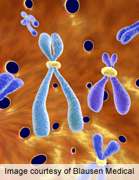A genome-wide association study of antineutrophil cytoplasmic antibody-associated vasculitis shows a genetic contribution to disease susceptibility, which differs between granulomatosis with polyangiitis and microscopic polyangiitis, according to a study published in the July 19 issue of the New England Journal of Medicine.
(HealthDay) -- A genome-wide association study of antineutrophil cytoplasmic antibody (ANCA)-associated vasculitis shows a genetic contribution to disease susceptibility, which differs between granulomatosis with polyangiitis and microscopic polyangiitis, according to a study published in the July 19 issue of the New England Journal of Medicine.
To investigate the genetic basis of ANCA-associated vasculitis, Paul A. Lyons, Ph.D., from the University of Cambridge in the United Kingdom, and colleagues conducted a genome-wide association study in a discovery cohort of 1,233 U.K. patients with ANCA-associated vasculitis and 5,884 controls. Associations were replicated in 1,454 Northern European case patients and 1,666 controls.
The researchers identified major-histocompatibility-complex (MHC) and non-MHC associations with ANCA-associated vasculitis. In addition, genetic distinctions were seen for granulomatosis with polyangiitis and microscopic polyangiitis. The strongest genetic associations were not with the clinical syndrome, but with the antigenic specificity of ANCA. Anti-proteinase 3 ANCA correlated significantly with HLA-DP and the genes encoding α1-antitrypsin (SERPINA1) and proteinase 3 (PRTN3). There was also a significant association between anti-myeloperoxidase ANCA and HLA-DQ.
"This study confirms that the pathogenesis of ANCA-associated vasculitis has a genetic component, shows genetic distinctions between granulomatosis with polyangiitis and microscopic polyangiitis that are associated with ANCA specificity, and suggests that the response against the autoantigen proteinase 3 is a central pathogenic feature of proteinase 3 ANCA-associated vasculitis," Lyons and colleagues conclude.
Several study authors and the editorial author disclosed financial ties to the pharmaceutical industry.
More information:
Full Text (subscription or payment may be required)
Editorial (subscription or payment may be required)
Journal information: New England Journal of Medicine
Copyright © 2012 HealthDay. All rights reserved.




















